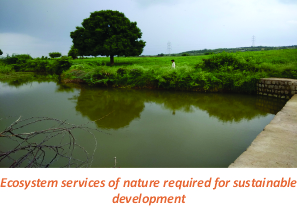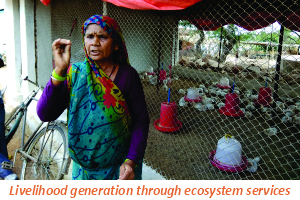Valuing Nature
and Ecosystem
Services post-COVID
COVID
scenario has exposed the human world to multiple challenges. Apart from the
immediate health risk, the challenges range from macro-economic crisis to
environmental threats. COVID-19 has also constrained social and human
development which is intertwined with economic and environmental scenarios.
In this context, the two major concerns are to prepare immediate coping
strategies (i.e. short term) against external shocks and to strengthen
adaptive capacity (i.e. long term). Better adaptive capacity of the
human-environmental system is vital for achieving sustainable development.
Short-term strategies to cope with the immediate impacts of the pandemic as well as measures taken to limit the health risk of the pandemic are already in place, across different countries. But for a post-COVID recovery, development of adaptive capacity in the long term is critical. Management of environmental resources is one of the most significant components in this context. It involves recognition of the vital services that our diverse ecosystems across spatial landscapes provide and framing strategies and actions to sustain that provision of ecosystem services.
The ecosystems supply essential resources like
food, water, materials for
producing consumable items, building physical infrastructure etc. Our
ecosystems also play the critical role of providing protection against
extreme events like storms, floods, regulating soil quality, supporting
biodiversity etc. and also provides cultural, educational, recreational and
several other direct and indirect benefits to human society.
for
producing consumable items, building physical infrastructure etc. Our
ecosystems also play the critical role of providing protection against
extreme events like storms, floods, regulating soil quality, supporting
biodiversity etc. and also provides cultural, educational, recreational and
several other direct and indirect benefits to human society.
Unsustainable extraction of natural resources leads to depletion of ecosystem services in the long term which in turn negatively impacts the direct and indirect benefits to the human world. Hence, in the post-COVID world, when there is urgent need for economic and health recovery through generation of livelihood opportunities, income, production and maintenance of human health, it is of utmost importance to keep the role of ecosystem services in consideration.
Given the fact that there is tremendous economic
and
 social
cost of loss of ecosystem services1, economic valuation of
ecosystem services is required for informed policy making. Although concepts
like “Gross Ecosystem Product” that take into consideration monetary value
of ecosystem services while accounting national income, already exist, but
they are not mainstreamed. The Millennium Ecosystem Assessment and
Intergovernmental Science Policy Platform on Biodiversity and Ecosystem
Services (IPBES) reports have highlighted the value of conservation of
biodiversity and ecosystem to sustain human and economic development. The
Economics of Ecosystem and Biodiversity (TEEB) programme of the United
Nation’s also emphasises upon the need for a holistic accounting of
ecosystem services for effective policy making.
social
cost of loss of ecosystem services1, economic valuation of
ecosystem services is required for informed policy making. Although concepts
like “Gross Ecosystem Product” that take into consideration monetary value
of ecosystem services while accounting national income, already exist, but
they are not mainstreamed. The Millennium Ecosystem Assessment and
Intergovernmental Science Policy Platform on Biodiversity and Ecosystem
Services (IPBES) reports have highlighted the value of conservation of
biodiversity and ecosystem to sustain human and economic development. The
Economics of Ecosystem and Biodiversity (TEEB) programme of the United
Nation’s also emphasises upon the need for a holistic accounting of
ecosystem services for effective policy making.
In the post-COVID scenario when it is time to build a robust recovery strategy of the nations across the world and in order to strengthen adaptive capacity; sub-national, national and international stakeholders (including governments, bi-lateral and multi-lateral organisations, businesses, academic and research community, civil society organisations etc.) must take initiatives to mainstream consideration of ecosystem service values in regular policy making and dialogues. Exchange of information and ideas across stakeholders and co-creation of context-oriented ecosystem service assessment frameworks are required in this regard. Along with that, engagement of local stakeholder communities at the grassroots level is vital for identification of the essential services provided by the ecosystems. Hence, an amalgamation of top-down and bottom-up approach would be able to assess the complex dynamics of the ecosystem services in order to build an efficient and effective recovery strategy. ■
Endnote:
1
https://www.nature.com/articles/d41586-020-01390-w
Satabdi Datta
sdatta@devalt.org